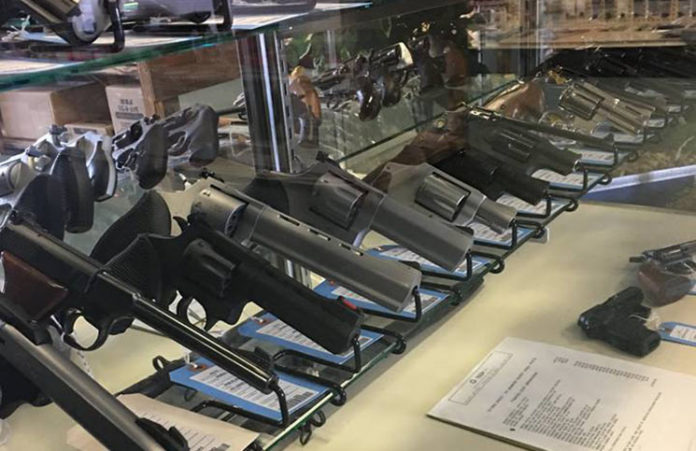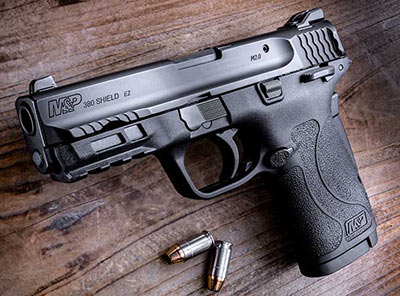
Washington voters’ approval of new gun control laws could create massive headaches for gun and gun safe dealers in the state.
Voters approved the measure, Initiative 1639, in November by nearly 60 percent. The legislation raises the legal age to buy any semiautomatic assault weapon from 18 to 21 and adds additional background checks, liability, safe storage requirements, yearly checks, fees and purchase restrictions. The age restrictions began on Jan. 1, with the rest going into effect in July.
Some gun shops say they’re already seeing a slight increase in sales of safes and trigger lock devices because of the new law, but those sales are almost certain to be offset by another provision that will shut down out-of-state sales to people from Oregon and elsewhere, said Dale Feathers, owner of Cascade Firearms & Supply in Vancouver.
“The law prevents us from selling to out-of-state residents, but it doesn’t stop our residents from going out of state and buying, it just stops us from selling to Oregon,” Feathers said. “A lot of the firearms dealers are jumping on a big lawsuit to sue the state because this is a detriment to business.”
The National Rifle Association and the Second Amendment Foundation in Bellevue filed a lawsuit in November in U.S. District Court challenging the initiative over Second Amendment violations. A hearing date hasn’t yet been set. So far, it’s unclear whether all facets of the new law will remain or some will be struck down, which is why nobody’s panicking just yet, Feathers said.
“We’re just waiting to see what holds and what doesn’t,” he said. “We don’t know much about it yet, but as it gets closer people will probably get more scared and we may see a rush of buyers before anything else kicks in. I think there will probably be a few changes to the law. That’s my belief. It’s hard to say, though, because I didn’t think it would go through in the first place.”
The safe storage requirements in the law add gross misdemeanor and felony charges for owners, who can be held responsible if someone not allowed to access a gun gets it and displays it publicly, discharges it or uses it in a crime. Owners with gun safes and trigger locks aren’t subject to that liability, which is why some stores are reporting an uptick in sales.
“Safe companies are seeing an increase in sales because of the law,” said Alan, a warehouse lead at Vancouver’s Tracker Safe, who asked that his last name be withheld. “I just see that continuing as this year progresses.”
Rep. Monica Jurado Stonier, a Vancouver Democrat, said she’s also heard that safes and trigger locks are selling rapidly at some stores.

“My dad bought a safe before Christmas, and the guy said they just can’t move them fast enough,” Stonier said.
Rick Clark, owner of Arms Tek, an online dealer in Vancouver, said he hasn’t seen any real changes in his purchasing traffic yet. He said the safe storage requirements aren’t really as horrible as some believe.
“If you allow a dangerous person to get their hands on your firearms, you’re liable,” Clark said. “But if they break in, you’re not liable for that. A lot of people are concerned about locking up guns, but as long as you don’t let dangerous people into your house, there’s not much to worry about.”
The out-of-state purchase restrictions could impact him somewhat, but as an online dealer when he ships out-of-state he ships to another licensed dealer in that state, and that process won’t be impacted under the new law, he said.
“The problem is that the laws are a patchwork,” Clark said. “You’ve got state laws and federal laws that kick in at various times, and there’s a lot of misinformation.”
One aspect of the law that nearly all local dealers complained about is the law’s definition of semi-assault weapons.
It defines them as: “Any rifle which utilizes a portion of the energy of a firing cartridge to extract the fired cartridge case and chamber the next round, and which requires a separate pull of the trigger to fire each cartridge. ‘Semiautomatic assault rifle’ does not include antique firearms, any firearm that has been made permanently inoperable, or any firearm that is manually operated by bolt, pump, lever, or slide action.”
That means that even a .22 caliber rifle falls into the category of a semi-automatic weapon, which dealers said is far too restrictive.
“They wrote their own definition and took everything, even a standard semi-automatic .22 – the thing everybody owns – and now that’s an assault rifle.” Feathers said. “Basically anything that uses its own power to eject a spent casing and inject another is now a semi-automatic assault rifle.”
Another sticking point is the firearms training class requirement, because it adds $80 to $100 to the purchase cost. Those buying a semi-automatic rifle must also first show proof of a firearms training class and wait 10 days before taking possession of what’s considered a semi-automatic assault weapon.
“In order to buy any semi-automatic, even a .22, you have to have had a safety class in the last five years,” Clark said. “Before you apply for a background check, you have to take this $100 class. And you have to take it every five years. To me, that’s harassment.”
Dealers are hoping to get some clarity through the NRA, Second Amendment Foundation lawsuit before the rest of the initiative goes into effect on July 1. Until then, there’s not much they can do except wait, Feathers said.
“Nobody knows where this is going right now,” Feathers said. “The laws haven’t been fully written.”



